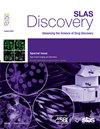Development of a cell-based target engagement assay for pyruvate dehydrogenase kinase
IF 2.7
4区 生物学
Q2 BIOCHEMICAL RESEARCH METHODS
引用次数: 0
Abstract
Pyruvate dehydrogenase kinases (PDHKs) are non-canonical serine/threonine kinases that regulate the pyruvate dehydrogenase complex. Given their central role in metabolism, dysregulation of PDHKs has been linked with a broad variety of pathological conditions, such as cardiovascular disease, diabetes, lactic acidosis, and cancer. While there are many small molecule PDHK inhibitors, including several that have advanced into clinical development, no PDHK inhibitor has been approved for therapeutic use for any indication. Currently the field lacks well-characterized tool compounds that can probe PDHK biology and differentiate between PDHK isoforms. Moreover, disconnects between biochemical and cell-based assays have complicated efforts to understand the biological effect of inhibiting PDHK catalytic activity. To better understand how PDHK inhibitors function in cells, we have developed a cell-based assay using NanoBRET Target Engagement technology. Here, we describe the use of NanoBRET to evaluate binding at the PDHK ATP and lipoamide sites. Using these assays, we have profiled previously described PDHK inhibitors and demonstrated the ability of NanoBRET to distinguish between PDHK inhibitors with different mechanisms of action and to elucidate isoform selectivity.

丙酮酸脱氢酶激酶细胞靶标结合试验的建立。
丙酮酸脱氢酶激酶(PDHKs)是调节丙酮酸脱氢酶复合物的非规范丝氨酸/苏氨酸激酶。鉴于pdhk在代谢中的核心作用,pdhk的失调与多种病理状况有关,如心血管疾病、糖尿病、乳酸酸中毒和癌症。虽然有许多小分子PDHK抑制剂,包括一些已经进入临床开发,但没有PDHK抑制剂被批准用于治疗任何适应症。目前,该领域缺乏表征良好的工具化合物,可以探测PDHK生物学并区分PDHK异构体。此外,生物化学和基于细胞的分析之间的脱节使得了解抑制PDHK催化活性的生物学效应的努力变得复杂。为了更好地了解PDHK抑制剂在细胞中的作用,我们利用NanoBRET靶结合技术开发了一种基于细胞的检测方法。在这里,我们描述了使用NanoBRET来评估PDHK ATP和脂酰胺位点的结合。通过这些实验,我们分析了先前描述的PDHK抑制剂,并证明了NanoBRET区分具有不同作用机制的PDHK抑制剂的能力,并阐明了同种异构体的选择性。
本文章由计算机程序翻译,如有差异,请以英文原文为准。
求助全文
约1分钟内获得全文
求助全文
来源期刊

SLAS Discovery
Chemistry-Analytical Chemistry
CiteScore
7.00
自引率
3.20%
发文量
58
审稿时长
39 days
期刊介绍:
Advancing Life Sciences R&D: SLAS Discovery reports how scientists develop and utilize novel technologies and/or approaches to provide and characterize chemical and biological tools to understand and treat human disease.
SLAS Discovery is a peer-reviewed journal that publishes scientific reports that enable and improve target validation, evaluate current drug discovery technologies, provide novel research tools, and incorporate research approaches that enhance depth of knowledge and drug discovery success.
SLAS Discovery emphasizes scientific and technical advances in target identification/validation (including chemical probes, RNA silencing, gene editing technologies); biomarker discovery; assay development; virtual, medium- or high-throughput screening (biochemical and biological, biophysical, phenotypic, toxicological, ADME); lead generation/optimization; chemical biology; and informatics (data analysis, image analysis, statistics, bio- and chemo-informatics). Review articles on target biology, new paradigms in drug discovery and advances in drug discovery technologies.
SLAS Discovery is of particular interest to those involved in analytical chemistry, applied microbiology, automation, biochemistry, bioengineering, biomedical optics, biotechnology, bioinformatics, cell biology, DNA science and technology, genetics, information technology, medicinal chemistry, molecular biology, natural products chemistry, organic chemistry, pharmacology, spectroscopy, and toxicology.
SLAS Discovery is a member of the Committee on Publication Ethics (COPE) and was published previously (1996-2016) as the Journal of Biomolecular Screening (JBS).
 求助内容:
求助内容: 应助结果提醒方式:
应助结果提醒方式:


